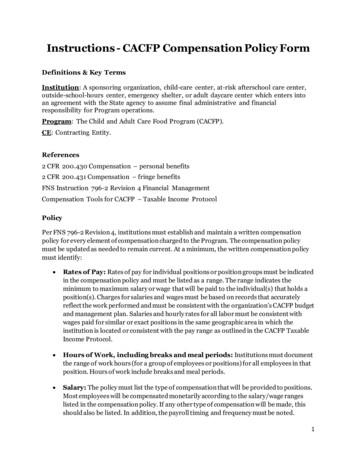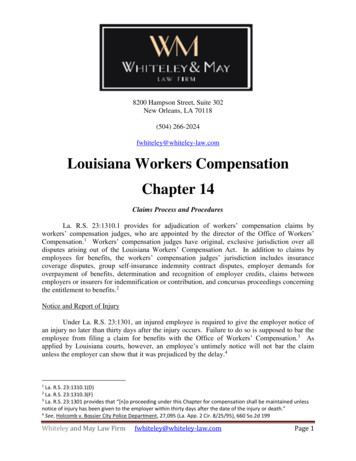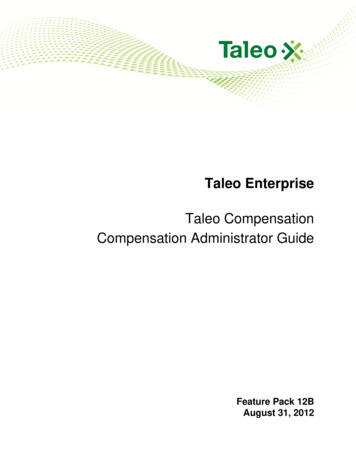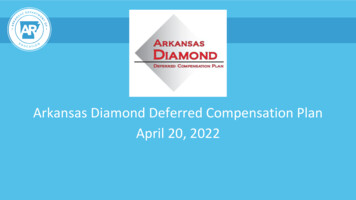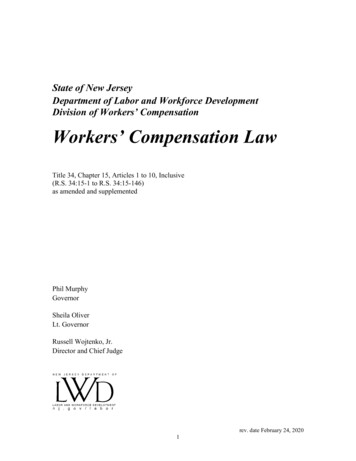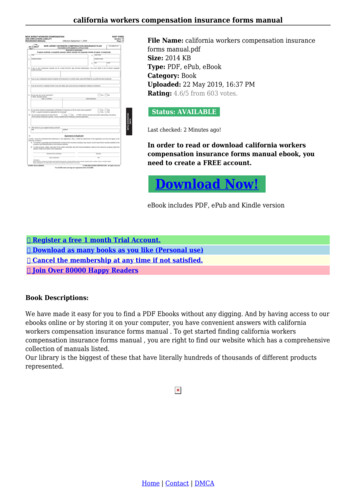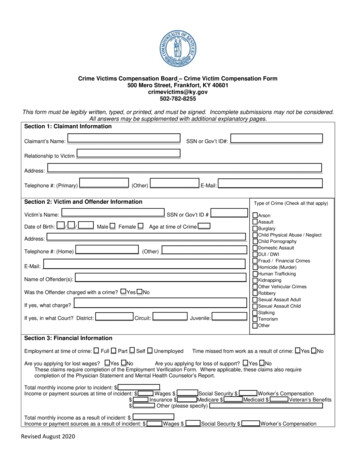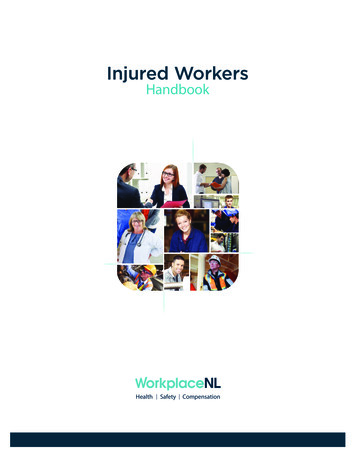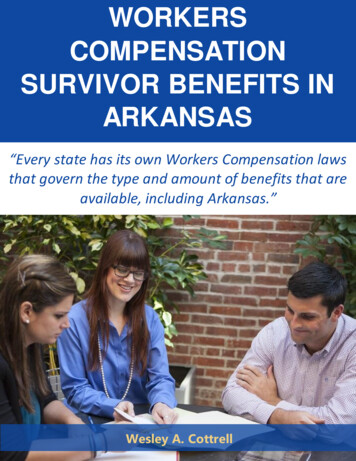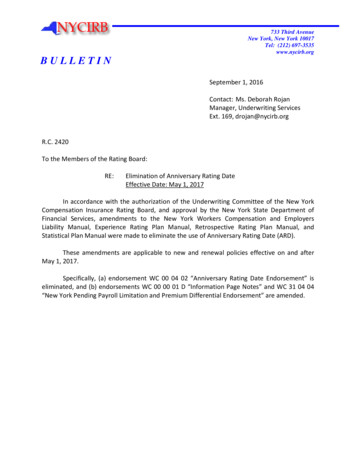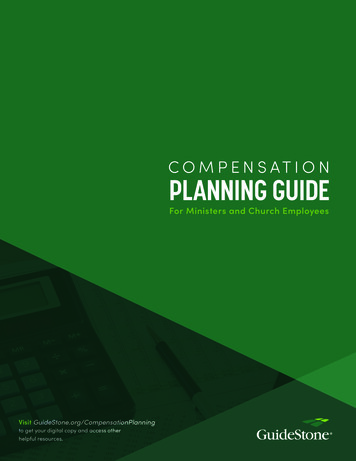
Transcription
C O M P E N S AT I O NPLANNING GUIDEFor Ministers and Church EmployeesVisit GuideStone.org/CompensationPlanningto get your digital copy and access otherhelpful resources.
THREE THINGSYOU NEED TO KNOW BEFORE YOU BEGIN1.The benefits of a compensation plan:Your church can maximize your resources by implementing a soundcompensation plan. It reduces confusion about expenses, benefits and staff income budgets. It ensures funds are spent appropriately. 2.3.It lets ministers and staff know you value them with a detailed compensation plan.The dangers of a “lump-sum” or “package” approach:Paying a lump-sum amount to your minister to break down as he desires can beunwise. It often causes ministers to pay higher taxes, increasing financial burdens fortheir families. It can lead to a financial hardship for the church if a minister does not set aside aportion of the lump sum for insurance coverage. It distorts the amount of actual income the minister has available to provide forhis family.The eligibility requirements of a Minister for Tax Purposes:Generally, a Minister for Tax Purposes is ordained, licensed or commissioned andfulfills a majority of the following: administers the ordinances, conducts religious worship, has management responsibilities and is considered to be a religious leader bythe church. These ministers have a dual tax status. They are employees for income taxpurposes and self-employed for the purpose of Social Security. They are exempt from federal income tax withholding.(Ministers must prepay their taxes by using the quarterly estimated taxprocedure, unless they elect voluntary withholding.) They are eligible for a church-designated housing allowance. hey must pay SECA taxes for Social Security coverage (non-ministerialTemployees pay half of the FICA tax and their employer pays the other half).CREATINGA COMPENSATION PLANAs a church, you have a responsibility to take care of those who serve on your staff,while also seeking to be good stewards of your limited financial resources. Thisworkbook can help you achieve that goal. It is designed for use by the person(s)who determines pay arrangements for ministers and church employees.We’ll help you build a solid compensation plan using six essential steps:Step 1Step 2Step 3Step 4Step 5Step 6Determine the Needs (page 4)Establish Written Compensation Plan Policies (page 6)Provide for Ministry-related Business Expenses (page 7)Provide Employee Benefits (page 10)Determine Personal Income (page 13)Complete a Compensation Planning Summary (page 16)As you take this step of good financial stewardship, remember that you’re not doingit alone. We’re always here to assist you and to answer any questions you may have.Contact us at 1-888-98-GUIDE (1-888-984-8433) between 7 a.m. and 6 p.m. CST,Monday through Friday. You can also email us at Info@GuideStone.org.For more information about Ministers for Tax Purposes, request our MinisterialTax Issues brochure or our annual Ministers’ Tax Guide by calling 1-888-98-GUIDE(1-888-984-8433). You can also access these and other helpful resources atGuideStone.org/CompensationPlanning.23
1VIEW THE RESULTS of the latest nationwide SBC ChurchCompensation Survey by visiting GuideStone.org/CompensationPlanning.Plus, you can see how your compensation plan for ministers and staffcompares with similar-sized SBC churches in your area.STEP 1:DETERMINE THE NEEDS Unless otherwise noted, all figures are annual amounts. Estimates can be based on actual amounts from the previous year. Shaded boxes are to be completed by the church.Name:Job title:Complete by: / /SECTION 1: MINISTRY-RELATED EXPENSES (see page 7 for examples)Personal Vehicle ExpensesDescriptionMinister/employee estimate(miles)Estimated business mileageMultiply mileage by the IRS standard rateto determine cost for vehicle’s business use;visit IRS.gov/tax-professionals/standardmileage-rates SECTION 2: EMPLOYEE BENEFITS (see page 10 for examples)Medical InsuranceDescriptionMinister/employee estimateAmount budgeted to provide benefitEstimated cost of medical coverage foryou (and your family, if applicable) DescriptionMinister/employee estimateAmount budgeted to provide benefitEstimated cost for your life coverage DescriptionMinister/employee estimateAmount budgeted to provide benefitEstimated cost for your disability coverage Life InsuranceDisability InsuranceAmount budgeted to reimburseexpenseN/ARetirement Plan Contributions DescriptionActual contribution last yearAmount budgeted for contribution403(b)(9) retirement plan contributionspaid by the church COMPENSATION PLAN REVIEW Travel Expenses4DescriptionMinister/employee estimateAmount budgeted to reimburseexpenseEstimated travel expenses for workrelated events (food, lodging, etc.) Ministry ExpensesDescriptionMinister/employee estimateAmount budgeted to reimburseexpenseEstimated expense on materials forsermon preparation, studies or churchfunctions Hospitality ExpensesDescriptionMinister/employee estimateAmount budgeted to reimburseexpenseEstimated expense for hosting churchgroups, speakers, etc., in a home or at arestaurant SECTION 3: PERSONAL INCOME (see page 13 for examples) COMPENSATION PLAN REVIEW Each minister and paid employee should complete a copy of this compensation planreview. By providing the information below, ministers and staff help the church betterestimate amounts that adequately meet the needs of their employees. Please note thefollowing:Personal SalaryDescriptionAmount budgeted by churchSalary paid to the minister/employee by the church Housing AllowanceDescriptionAmount requested by ministerHousing allowance, if applicable, (in addition to salary) that will be provided bythe church next year* Salary IncreaseDescriptionYesNoDescriptionMinisterAmount budgeted to offset expenseAmount of self-employment (SECA) taxyou paid on your church income last year* Did you receive a salary increase lastyear? Check either Yes or No.Professional Development ExpensesDescriptionMinister/employee estimateAmount budgeted to reimburseexpenseEstimated amount for continuingeducation, workshops or learningconferences SECA Taxes Paid*Applies only to Ministers for Tax Purposes.5
2STEP 2:ESTABLISH WRITTEN COMPENSATION PLAN POLICIESWritten policies reduce confusion by forming a standard for current and future actions.They also help your ministers and employees clearly understand the provisions andexpectations of the church. The policies should cover the following four major areas:1.2.Ministry-related ExpensesNote: These should be funded by the church apart from the minister’s/employee’s salary. Allowable business expenses (need to be consistent with IRS rules) Employee recordkeeping and expense account reporting expectations Reimbursement rate for mileage expenses Allowable conference and convention expenses Reimbursement amount for books, publications, technology, etc. (as well as who willown the reimbursed items)Employee BenefitsNote: These should be funded by the church apart from the minister’s/employee’s salary. Medical, life and disability coverage Retirement contributions provided by the church 3.Educational expenses eligible for reimbursementPersonal Income Salary and any amounts designated as housing allowance for eligible ministers Social Security withholdings for non-ministerial employees (see the section titled“Social Security” under Step 5 for more information) Social Security offset for Ministers for Tax Purposes (see the section titled “Social Security” under Step 5 for more information) Willingness to withhold taxes at the request of a Minister for Tax Purposes How the church will designate the housing allowance (see the section titled “Minister’sHousing Allowance” under Step 5 for more information) Procedure for personnel reviews and salary increases4. Personnel Policies Vacation Sick and sabbatical leave Outside speaking engagements Hiring requirements Employee classifications Work hours and pay periods 6STEP 3:PROVIDE FOR MINISTRY-RELATED BUSINESS EXPENSES3Ministers and employees naturally have expenses related to the work they need to accomplish.However, these expenses should never be a burden to them. As such, the expenses should befully paid for by the church and should not impact any portion of a minister’s or employee’spersonal income.Examples of ministry-related expenses include: Vehicle use for business purposes Meetings, workshops and conferences Books, publications, technology, and audio or video resources Continuing education opportunities Provisions for ministry-related hospitalityAddressing Ministry-related Expenses with an Accountable Reimbursement Plan (ARP)An ARP is a plan you create to help explain terms, conditions and tax rules related to allowableministry expenses. With this type of plan, the church creates a reimbursement budget, the ministeror employee turns in an expense report and the church uses that report to reimburse the minister oremployee. Also, it’s important to know employees pay no taxes on reimbursements, and they are notincluded on a Form W-2.Impact of the Tax Cuts and Jobs Act of 2017 (TCJA) on Ministry-related ExpensesOn December 22, 2017, the TCJA was signed into law to be effective beginning January 1, 2018,reducing tax rates and modifying credits and deductions for both individuals and businesses.In particular, the law removed tax deductions for unreimbursed business expenses, making theuse of an ARP by churches and ministries even more essential as they pursue financial stewardship and balanced budgets. For more information, please see IRS Publication 15.Requirements for an ARP All expenses must have a business purpose related to the minister’s or employee’s duties. Expenses must be verified with documentation of the amount, date, place andbusiness purpose. Documentation should be provided within 60 days of incurring the expense, andany excess reimbursements should be returned to the church within 120 days. The church should consider using the IRS standard mileage rate for transportationand per diem rates for meals. These rates can be accessed at IRS.gov/tax-professionals/standard-milage-rates and www.irs.gov/pub/irs-drop/n-18-77.pdf. Unused ARP money should not be given as a bonus or additional income. All reimbursements must come from employer funds, not by reducing salary or allowing aminister to rearrange his salary package.Business use of cell phones and computers7
SAMPLE: ACCOUNTABLE REIMBURSEMENT PLAN1 The church hereby establishes an accountable reimbursement plan for all ministers and employees with the following terms and conditions intended to comply with all applicable tax rules. Thechurch will reimburse only reasonable ministry-related business expenses incurred by a ministeror employee. Subject to budget limitations, these expenses will include: Business use of automobile, up to the current IRS standard mileage rate Business travel away from home, including transportation, lodging and meals onovernight trips Convention, conference and workshop expenses Continuing education expenses Subscriptions, books and technology if related to ministry or employment Entertainment/hospitality expenses, if business connection requirement is met2 The minister or employee will account for each allowable expense in writing at least every 60 days.Documentation will include the amount, date, place, business purpose and business relationship ofany person entertained for each expense. A receipt will accompany the documentation.3 The minister or employee will return advances that exceed actual business expenses within 120 days.HOW TO CREATE AN ARPIN THREE EASY STEPS4 Under this accountable arrangement, the church will not report reimbursed amounts as taxableincome on the minister’s or employee’s Form W-2. The minister or employee should not reportreimbursed amounts as income on his or her federal income tax return.1 Decide what expenses will be covered and outline a plan (see the Sample: Accountable Reim-bursement Plan on the next page). Then determine how much money the church will budget tocover these expenses separate from personal income. If applicable, you may want to use lastyear’s figures in each category as a guideline.2 Instruct ministers and employees to submit an expense report within 60 days of incurring ex-penses (see the Sample: Expense Report form on the next page). Receipts should be requiredfor purchased items, and for automobile expenses, mileage should be reported.3 Reimburse ministers and employees at least once a month for all approved expenses (this re-imbursement should not affect their personal income). Additionally, advances can be given foranticipated expenses, but unused funds from those advances must be returned to the churchwithin 120 days.A Word of Caution About Reimbursement Arrangements Through Salary ReductionAccording to IRS Code section 62(a)(2)(A), business expenses must come from employerfunds, not by reducing salary or by allowing the minister or employee to rearrangehis or her compensation package. That type of salary reduction will qualify as a nonaccountable arrangement, and the church will have to report the amounts on the minister’s or employee’s Form W-2 as income. In general, the minister or employee will haveto pay more taxes if the church chooses this option.8SAMPLE: EXPENSE REPORTEmployee name: Rev. John SmithFor the month of: JanuaryDateDescription of ExpenseBusiness PurposeAmountJanuary 17–18Mileage to conferenceMileage (457 x .58)* 255.92January 17Meals at conferenceMeals 53.25January 17–18HotelLodging 120.00January 17Sunday school teacher’s guideMinistry expense/books 53.00Subtotal 482.17Minus advance 200.00Total reimbursementdue 282.17*This figure is subject to change on an annual basis. For the latest update, visit IRS.gov/tax-professionals/standard-mileage-rates.9
4STEP 4:PROVIDE EMPLOYEE BENEFITSA strong employee benefit plan includes retirement contributions along with medical, lifeand disability coverage for ministers and other employees. Making these benefits availableis a tangible way to show your church staff you care — which can help attract quality, newemployees and reduce turnover. A well-rounded employee benefit plan also provides thefollowing advantages:INSURANCE PLANSProtect Your Employees and Your ChurchChurches who provide ministers, employees and their families with medical coverage,term life insurance, disability and accident coverage are providing protection and peace ofmind. In return, employees do not have to spend time purchasing and managing their ownbenefits and are free to focus on helping your church reach its ministry goals. Neglecting toprovide insurance benefits can place an unnecessary burden on your employees’ familiesshould an unfortunate event occur.Provide Employees with Appropriate CoverageGuideStone can help churches and other ministry organizations provide employee benefitsfor employees and their families with a variety of medical plans -- including comprehensivehealth plans, consumer-driven Health Savings Account (HSA)-qualified High DeductibleHealth Plans or protection plans, including our lower-cost Secure Health plan, which is aless-risky, comparably priced option to medical sharing plans.This coverage offers protection and portability for ministers and other employees,potentially allowing them to take their insurance coverage with them as they are called fromone place of ministry to another.You may also be able to lower the income taxes paid by your ministers and other staff byestablishing a Flexible Spending Account or Health Savings Account in coordination withyour medical plan.To learn more about the life and health coverage options available with GuideStone, emailInsurance@GuideStone.org or call 1-844-INS-GUIDE (1-844-467-4843) between 7 a.m. and6 p.m. CST, Monday through Friday. You can also find information online at GuideStone.org.10Create Potential Tax AdvantagesMoney that your church spends on certain employee benefits, such as accident and healthcoverage, is not counted as taxable income for the employee. In addition, churches may payfor employee group term life insurance up to 50,000 on a tax-free basis.In the past, churches would often ask employees to obtain their own health benefits and thenreimburse the employee for the cost of those benefits. However, because of changes in the law,this is no longer an option.Because GuideStone is classified as a church benefits board, all of our medical plans — evenPersonal Plans sold to individuals — are classified as “group health plans” by the ACA and theIRS.These tax-saving ideas should not be viewed as loopholes. Rather, they represent a wise use oftax laws to help your ministers and staff pay the least amount of taxes they legally owe.STAY INFORMEDON HEALTH CAREREFORMGuideStone is your health care reform advocate.Visit GuideStone.org/HealthReform to learn about provisions that mayimpact your ministry or employees. You can also register for email alertsthat will keep you up-to-date on the latest ACA news.RETIREMENT PLANSPrepare Employees for the FutureWhile they never see themselves retiring from their calling to ministry, ministers and employeesdo need income to live on once they leave paid ministerial service to provide for families,missions, church planting or other ministry endeavors.Historically, one of the best ways to build this income is through a retirement plan, like the403(b)(9) Retirement Plan offered by GuideStone. Churches should consider offering sucha plan that includes an employer-provided contribution paid by the church. GuideStonerecommends the employer contribute an amount equal to 10% of the employee’s salary.Employees should then also be encouraged to make additional contributions from their ownsalary.11
Offer a Plan Exclusively Designed for MinistriesThe 403(b)(9) Retirement Plan from GuideStone is designed exclusively for churches andministry organizations. All ministerial and non-ministerial employees receiving W-2 incomefrom the church (including administrative assistants, custodians and church-school workers)can participate. Some of the features of the plan include: Employees’ tax-sheltered contributions provide savings now by immediately loweringthe taxable portion of their salary. Further, both contributions and earnings grow taxdeferred until they are withdrawn. Employees’ Roth contributions provide savings later by including contributions within thetaxable portion of their salary now as opposed to retirement. Plus, earnings on the Rothcontributions will be completely tax-free upon distribution if:o The participant is age 59 ½ or older ando Five years have passed from the date of the first contribution to the account. Eligible ministers don’t pay SECA taxes on their tax-sheltered contributions. An eligible minister can designate up to 100% of his benefit as a housing allowance atretirement. Participants benefit from a multi-manager investment approach that provides access toa well-diversified, structured portfolio of mutual funds. All Funds are Christian-screened and adhere to moral and ethical investment guidelinesapproved by GuideStone.For information about our retirement plans, call 1-888-98-GUIDE (1-888-984-8433) between7 a.m. and 6 p.m. CST, Monday through Friday. You can also find information online atGuideStone.org/Retirement.THE CHURCH RETIREMENT PLAN FORSOUTHERN BAPTIST CHURCHESGuideStone offers the Church Retirement Plan, which may provide discretionary contributions and protection benefits* for Southern Baptist church employees. If you are an SBCchurch, please contact GuideStone to learn more about this plan.*Benefits are provided by GuideStone and the Baptist stateconventions. Eligibility for and type of benefits offered vary byconvention. Visit GuideStone.org/SBCChurchBenefits or contact GuideStone for more details.12STEP 5:DETERMINE PERSONAL INCOME5A number of factors should be considered when determining the personal income of ministersand employees. Keep in mind that ministry-related expenses and the cost of benefits should notbe considered part of personal income.Responsibilities and ExperienceThose called to the ministry usually do not follow their calling in order to become wealthy.However, they should not be expected to live on inadequate wages. Additionally, merit increasesin recognition of exceptional service should not be considered inappropriate. To help determinean appropriate income, consider the income of other professionals in your community withsimilar experience and responsibilities. Reviewing the latest SBC Church Compensation Surveycan also help you determine appropriate compensation, which is available at GuideStone.org/CompensationPlanning.InflationIt is imperative for churches to consider inflation when reviewing pay each year. Historically,inflation has averaged around 3% annually. It’s important to note that for every year your ministers’and employees’ pay is not adjusted to meet the rate of inflation, their income has statistically lessand less buying power as they seek to provide for their families.Social SecurityChurches with non-ministerial employees should keep in mind that the church is required to paythe employer portion of Social Security taxes. The employee portion of FICA taxes is then withheldby the church from the non-ministerial employees’ salary. Ministers for Tax Purposes, on the otherhand, pay SECA taxes, and they must pay all of this tax themselves. GuideStone encourageschurches to provide additional income to the minister for use in paying this tax. This is sometimescalled a Social Security offset and usually equals one-half of the SECA tax rate. When it is given tothe minister by the church, it must be designated as taxable income on the minister’s Form W-2.Minister’s Housing Allowance (available only to Ministers for Tax Purposes)Ministers who own or rent a home may save taxes if a church designates part of their incomeas minister’s housing allowance. Ministers who live in a parsonage may also be entitled to ahousing allowance designated by their church if they have eligible housing expenses. Churchescannot designate a minister’s housing allowance retroactively. To learn more about these housingqualifications, access our annual Ministers’ Tax Guide at GuideStone.org/TaxGuide.How to Designate a Housing Allowance1 The minister should present the church with an estimate of housing expenses. Seethe Sample: Minister’s Estimate of Housing Expenses Form on the next page as atemplate.13
SAMPLE: MINISTER’S ESTIMATE OF HOUSING EXPENSES FORMTo (church):To (minister’s name):From (minister):This is to advise you that at the business meeting ofHousing allowance for (year):held on / / (date) your housing allowance for the year was officiallyItem1.Down payment on a home designated and fixed in the amount of . Accordingly, of the total payments to youduring the year (and all future years until changed by official church action) will constitute your2. Mortgage payments on a loan to purchase or improveyour home (include both principal and interest) 3. Real estate taxes 4. Property insurance 5. Utilities (electricity, gas, water, trash pickup,local telephone charges) for the year . Utilities will be paid by:6. Furnishings and appliances (purchase and repair) 7.Structural repairs and remodeling 8. Yard maintenance and improvements You should keep an accurate record of your eligible housing expenses to provide proof of any amounts ex-9. Maintenance items (pest control, etc.) cluded from income for income tax purposes when filing your federal income tax return. You may not exclude10. Homeowners association dues 11. Miscellaneous: TOTAL EXPENSES Minister’s signature:Date:SAMPLE: NOTIFICATION OF HOUSING ALLOWANCE FROM THECHURCH TO THE MINISTER/annual housing allowance.If a parsonage is provided, add: You will also have rent-free use of the home located at:the churchthe ministerThis action is recorded in the church minutes.a housing allowance as income for SECA tax purposes. It is your responsibility as a taxpayer to understandand follow the limits about how much you can exclude from income as a housing allowance for income taxpurposes and accurately report your income. For information on limits and reporting of housing allowance,see s signature: Date / //2 The church must officially designate and document the amount of the minister’s housing allowancein advance of paying the minister. This should be done every year.To avoid potential tax consequences of forgetting to designate a housing allowance one year,the church should make the annual designation for the current year “and all future years” until it ischanged by official church action. The church should record this action in the church minutes andnotify the minister.If circumstances change, the amount designated as a housing allowance may be revised during the year; however, no changes can be made retroactively. Remember, there are limits on howmuch a minister can exclude from income as a housing allowance. As taxpayers, ministers areresponsible for reporting their income properly.Since ministers who live in a church-owned parsonage are not able to build equity in a home, manyare concerned about how they will pay for housing when they retire. Accordingly, churches can makeadded contributions (within legal limits) to a minister’s 403(b)(9) retirement account that can be used tomeet this need.For more information about the benefits and requirements of a housing allowance, visitGuideStone.org/HousingAllowance or call GuideStone at 1-888-98-GUIDE (1-888-984-8433)between 7 a.m. and 6 p.m. CST, Monday through Friday.Use the sample on the following page as a template:1415
6STEP 6:COMPLETE A COMPENSATION PLANNING SUMMARYNow that you know what makes up a compensation plan, look over the compensation planreview(s) (page 4) you received from your minister(s) and/or church employee(s). You cannow identify areas of inadequate support that should be addressed in the coming year’sbudget.“Well done ”Matthew 25:21Use this worksheet to develop a comprehensive compensation plan for your new budget year.Please note that the worksheet is purposefully designed not to add together the threecategories of compensation (expenses, benefits and personal income), as that could result inrecreating a lump-sum approach — which is not suggested.Ministry-related Expenses (not income)1. Automobile 2. Conventions/conferences 3. Books, periodicals, software 4. Continuing education 5. Hospitality Employee Benefits (not income)1. Life and health coverage a. Medical b. Disability c. Term life d. Personal accident e. Dental 2. 403(b)(9) retirement plan contribution Personal Income1. Personal salary 2. Housing allowance 3. Social Security offset(taxable) If you have questions about these steps or any of the material covered in this workbook, GuideStoneis ready to assist you. Call us at 1-888-98-GUIDE (1-888-984-8433) between 7 a.m. and 6 p.m. CST,Monday through Friday, or email us anytime at Info@GuideStone.org.Do well. As a ministry organization, every asset you have is committedto a higher calling — your employees, your work and your mission. WithGuideStone, you can provide your employees with a retirement plan thatis not only designed with ministry in mind but also aligns with your valuesand mission.Do right. GuideStone has been enhancing the financial securityof pastors, staff and seminary students of evangelical Christianorganizations since 1918; we truly understand the unique needs of thosewho serve the Lord. GuideStone offers industry-leading retirement andinsurance plans without sacrificing Christian values.The annual Ministers’ Tax Guide includes a detailed description of these and other importantfederal requirements. You can access this free resource at GuideStone.org/TaxGuide.1617
ADDITIONAL RESOURCESGuideStone wants to help you in any way we can, so we encourage you to takeadvantage of the following financial planning resources at no cost to you: Compensation Planning GuideGuideStone.org/CompensationPlanning 403(b)(9) Retirement Plan for churches information (retirement plan for ministers and churchemployees)GuideStone.org/ChurchPlan Personal and group insurance options, including medical, term life, accident, dental and disabilitycoverageGuideStone.org Ministers’ Tax Guide and Federal Reporting Requirements for ChurchesGuideStone.org/TaxGuide Ministerial Tax IssuesGuideStone.org/TaxGuide Property and casualty coverageGuideStone.org/PACVISIT GuideStone.org/CompensationPlanningto get your digital copy and access other helpful resources.18
GuideStone is ready to help.View our Compensation Planning Guide workbook and access othervaluable resources at GuideStone.org/CompensationPlanning.5005 LBJ Freeway, Ste. 2200, Dallas, TX 75244-61521-888-98-GUIDE GuideStone.org 2021 GuideStone 55394502/212156
A COMPENSATION PLAN 1. while also seeking to be good stewards of your limited financial resources. This The benefits of a compensation plan: Your church can maximize your resources by implementing a sound compensation plan. It reduces confusion about expenses, benefits and staff income budgets. It ensures funds are spent appropriately.
